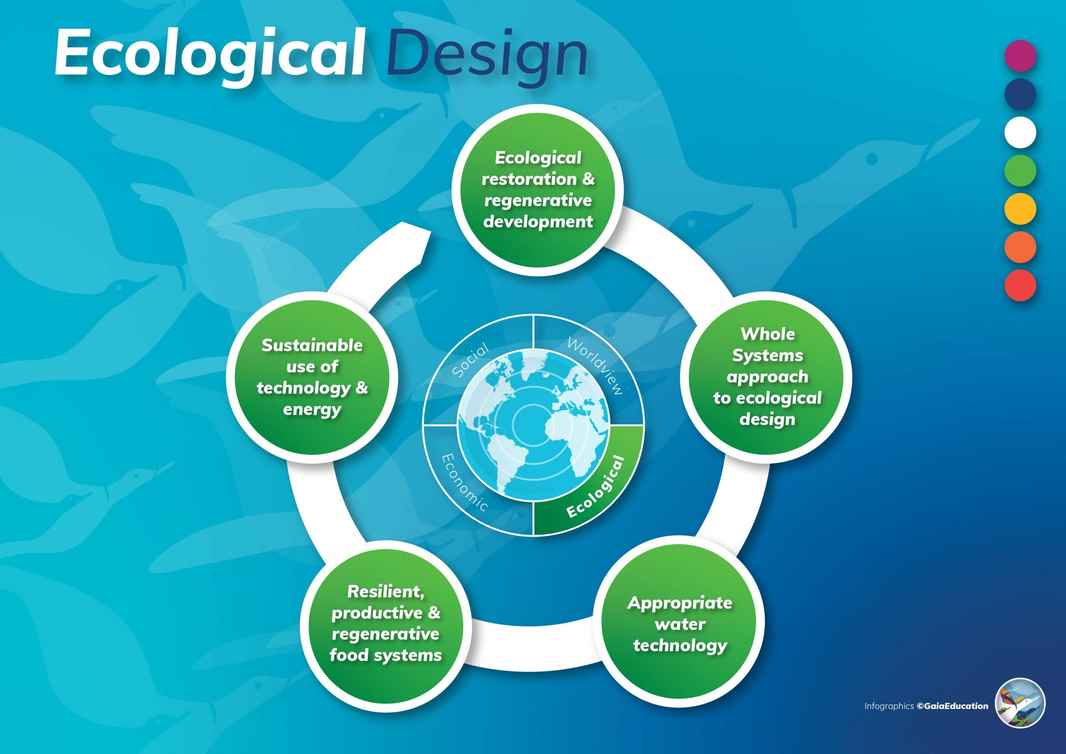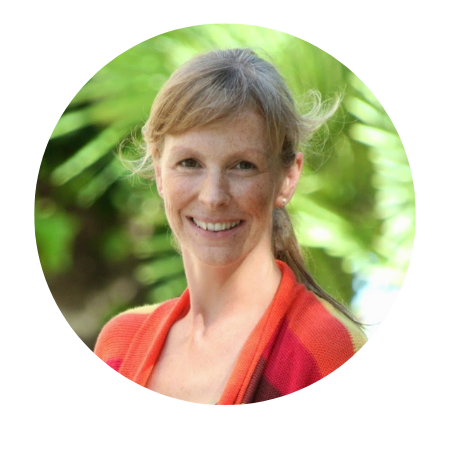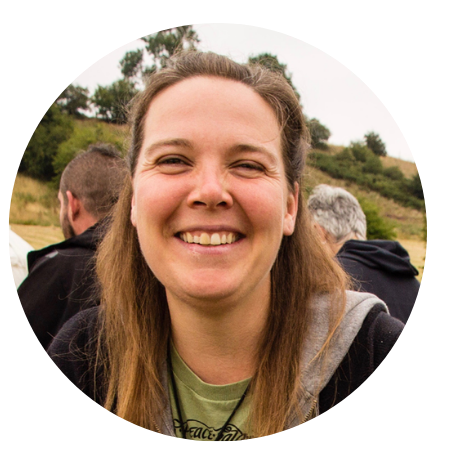Ecological Dimension
Programme Overview
Type: e-Learning
Start Date: January 2025
Study Time: 10 hours/ week
Facilitation: With Facilitators
Level: Intermediate
Registrations: until January 2025
Developed by:
Our ability to stay creative, flexible, collaborative and adaptive in the face of changing environments is key to address the challenges we collectively face. Join the Gaia Education online course and become an ecological designer to ensure that life-supporting natural functions are not only preserved but regenerated whenever possible.
Ecological Design refers to sustainability from a whole systems design perspective that embodies systemic thinking.
Ecological education and design is a multifaceted field embracing green regenerative architecture, sustainable agriculture, ecological engineering, permaculture solutions, clean renewable energy sources, eco system restoration and regenerative development. Any practises that help to sustain a pattern of ecological interdependencies and nurture the conditions for all living systems to thrive.
This course is part of the full Design for Sustainability online course. You can either take it as a stand alone or sign up for the full course.
Interested in a Master's or PhD in Sustainability?
We now partner with Ubiquity University and you can continue your education obtaining a Master's or PhD once you have completed your GEDS.
More information here
Learn to create elegant solutions carefully adapted to the biocultural uniqueness of place
This distance learning course will provide a broad perspective of the historical roots of design ecology thinking and explore how regenerative design, permaculture, environmentally sustainable economic development and engineering and environmental restoration could support the fundamental redesign of humanity’s impact on Earth.
Acquire the fundamental skills to become an ecological designer and create self-regenerating sustainable settlements.
Working with natural patterns, embracing all living systems, we would explore how can we co-create decentralised and re-regionalised ecological settlements and cities that are adapted to the unique conditions of their bioregions in ways that help us to move beyond adaptation and mitigation towards regenerative development, to stay below 1.5 degrees of warming.

Ecological Dimension
Ecological designers work with Nature rather than against her to support the creation of life. They know that ecological concerns are fundamental to the design and development of ecovillages and sustainable communities. They also understand that such initiatives need to collaborate regionally and globally to improve the whole system for all of humanity and the wider community of life.
In the Ecological dimension you will address the following questions:
- Why is the current impact of humanity on the planet’s life support system degenerative and how can we change this through whole-systems design approaches?
- How can we co-create elegant solutions carefully adapted to the biocultural uniqueness of place?
- What is the wide range of water collection, management and ecological treatment technologies that can support us in the design of watershed stewardship systems?
- How can we use the best of permaculture, regenerative agriculture, agroforestry and ecosystem regeneration to co-create thriving regional food systems?
- Which renewable energy generation, energy efficiency and transport technologies can help us to create zero-carbon energy solutions while increasing community resilience and strengthening regional economies?
- What range of ecological construction methods are appropriate for which kind of local conditions and how can they support development and ecological health at the local and regional scale?
In the Ecological dimension you will learn:
- To make a whole-systems design of your projects using permaculture principles in different ecosystems
- To use base maps and other eco design techniques
- To calculate your environmental footprint and design to be carbon neutral for minimal ecological impact
- To design a whole water system for your projects
- To apply green building principles in your projects
- To improve your ecological system design thinking

Course Content
Module 1: Whole Systems Approach to Ecological Design
Starting from the concept of ‘building cultures of sustainability’, this section covers the ‘big picture’ as well as looking at the philosophical foundations and principles of ecological design.
We look at the whole system in which we live our lives and how we can affect the world through the specific design decisions we make and implement. There are many case studies and ecological sustainability examples for you to learn from.
Module 1 explores the following questions:
- What are the historical roots of ecological design thinking and how do permaculture, ecological economics and engineering, industrial ecology and cradle-to-cradle, environmental restoration and regenerative design contribute to this approach?
- What is the context of crisis and opportunity as we embark on a fundamental redesign of humanity’s impact on Earth? What do we need to know about climate change and tipping points, ecological and carbon footprinting, Earth Overshoot Day and the Happy Planet Index to design with a whole systems perspective in mind?
- How can we co-create decentralised and re-regionalised ecological settlements and cities that are adapted to the unique conditions of their bioregions in ways that help us to move beyond adaptation and mitigation towards regenerative development, to stay below 1.5 degrees of warming?
Module 2: Appropriate Water Technology
The link between fossil fuel reserves and war has been a clear pattern for decades, yet equally many violent conflicts and wars have already been fought over the access to water.
Water is a very scarce resource and yet is wasted and contaminated on a gigantic scale.
A seventh of the world’s population is still without access to a safe water supply.
Learning to create more efficient systems to care for the world’s water is critical.
Module 2 asks:
Can we take a whole systems approach to water by mapping our water supply within the context of bioregional watershed management and restoring the hydrological cycles upon which healthy ecosystems functions and thriving communities depend?
What do you need to know about ecological engineering, rainwater harvesting, compost toilets, constructed wetlands and the fundamental processes of biological wastewater treatment – such as anaerobic and aerobic digestion, nitrification and denitrification – in order to make informed design decisions?
Which of the following treatment options are the most appropriate for the specific conditions of a particular project: constructed wetlands, septic tanks, biogas digesters, lagoon or tank-based systems, horizontal or vertical flow reedbeds or community-scale treatment systems?
Module 3: Local Food Systems
Healthy local food is one of the best entry points into building sustainable community, whether in a newly built ecovillage or in the transformation of a village or town.
Food invites us to think about our health, our local economy and our relationship with the land.
Since food is a basic need, we need to make sure to design resilient, productive and regenerative food systems as the foundations of thriving communities and regions.
Module 3 addresses the following questions:
What are the essential lessons from permaculture regarding ethics, principles, zoning and learning from nature, that we can combine with regenerative agriculture techniques like holistic land management, keyline ploughing, organic fertilisers, agroecology, analogue forestry and biodynamic farming to drive the redesign or our food systems in a regenerative way?
How can we use fungal mycelia, activated bio-char, Terra Preta and other carbon farming techniques to build healthier soils and respond to the threats of climate change?
What are the tools and techniques needed to create integrative whole system designs for regenerative food systems? These are needed to drive the regeneration of healthy ecosystems functions, soil, waterways and forests while integrating aquaponics, community-supported agriculture and large scale Earth restoration into win-win-win solutions for people and planet.
Module 4: Appropriate Technology
This module deals with the appropriate technology for the generation and use of energy.
The module also looks at sustainable design of carbon neutral energy systems and explores these technologies as part of a resilience strategy for sustainable communities and ecovillages.
Scaling and scale are important aspects to consider in order to appropriately cater for various types of developments, locations and bioregions.
In Module 4 we address the following questions:
How can we use tools like ecological and carbon footprinting of energy sources and concepts like ‘embodied energy’ or ‘Energy Return on Energy Investment’ (EROEI) to make better choices when it comes to designing or retrofitting regenerable energy systems?
What should we consider when we have to choose between wind power, solar photovoltaics, solar thermal, renewable biomass, hydroelectric, marine wave or current and geothermal energy systems, as well as, efficiency measures to design with local conditions and ecosystems in mind?
How can we ensure that appropriately generated biofuels and/or alternative energy carriers can help us re-design our current transport systems in ways that improve sustainability and reduce their impact?
Module 5: Green Building and Retrofitting
This module explores the challenges inherent in modern building and construction techniques and explores alternatives that are more energy efficient and less environmentally damaging.
You will learn to discriminate between different building methods, material choices and architectural styles and how to adapt them depending on local and regional conditions.
We also explore how best to retrofit poorly designed structures and improve the patterns of suburban sprawl.
Module 5 invites you to consider the following questions:
How can we create ecologically designed buildings that function like an ecosystem to help regenerate health and wellbeing for their residents and the ecosystems within which they are located?
What is the role of different heating and cooling technologies, bioclimatic building, airtightness and ventilation, green roofs, green walls and choosing local materials in creating a new approach to architecture that helps to heal the planet?
To what extent can whole systems thinking, smart buildings and smart grids, and keeping an eye on the ecological footprints of buildings and utilities, help us to create healthier carbon neutral settlements for one-planet living?

Facilitators
One of the best aspects of our courses are our facilitators: Gaia Education facilitators are usually experienced facilitators who are deeply involved in their own communities and "walk the talk", embracing in their own lives the practices and concepts they share with participants. Many of our facilitators are also Gaia Education Certified Trainers and/or recognized facilitators in other networks, including the Work That Reconnects Network, Permaculture Womens Guild, the Transition Network, etc.
Kym Chi is a grateful settler on the unceded Coast Salish territories of the Squamish and shishalh Nations where she stewards land, facilitates courses, runs a holistic healing practice and is the Dean of the School of Permaculture Design at Pacific Rim College. Kym has spent many years growing her understanding of the natural world and through this has developed a strong passion for herbalism, plant connection, resilience, creative facilitation, art, community building, decolonization, reconciliation and regenerative design. She continues to do self study and take courses that help her to deepen a healthy relationship with nature and its inhabitants. In all of her practices, Kym strives to work with empowerment models and feels that her own success is measured on the successes of those she collaborates with along with her allies and friends.

Certificate of Completion
Upon certification you will have the background and confidence to take an active role in designing for sustainability, resilience and regeneration, both professionally and personally, working for small and large- scale community projects, eco-social enterprises or transition initiatives in civil society, the public sector or business.
You will feel ready to offer your contribution and facilitate others to contribute to the collaborative transformation of our existing communities, institutions and neighbourhoods towards more sustainable and regenerative patterns of being and doing in the world.
What is more, you will be able to support yourself and others in leading healthier, more joyful and more meaningful lives.
To receive a Certificate of Completion students need to engage in all four dimensions plus the Design Studio over a 14-month period. However, the dimensions do not need to be completed within the same year. For those who require more time it is also possible to complete within 36 months, once registered in the full programme. At the end of their participation students will have successfully completed the minimum required activities for each dimension and a satisfactory team-design project.
Registration
- The Ecological Design course will run every year and runs for 8 weeks (including an orientation period).
- We suggest you dedicate a minimum of 10 hours a week to receive maximum benefit from this programme.
- If you register early, you are able to get a discount. The full price of this programme is £350 GBP.
- A limited number of full and partial scholarships are available. We will be accepting scholarships until December 15 and will notify the results by December 22. (please read below for more information before you apply)
- For further information, please email: info@gaiaeducation.org
The Ecological dimension can be taken as a stand-alone programme or as the starting point for our 10-month online Design for Sustainability certificate course.
After completing the Ecological dimension, you will be equipped with the understanding and skills to become a confident change maker in ecological issues of sustainability.
Graduates of our programmes have gone on to contribute to sustainability projects, build communities, become social entrepreneurs, partake in permaculture projects and bio-dynamic farming, support transition movements and much more.
A limited number of full and partial scholarships are available. We will be accepting scholarships on an ongoing basis but there are deadlines that depend on when each dimension starts, scholarships are offered only for individual dimensions. Please note that scholarships are awarded one course at a time and never for the full program. Awarding successive courses is dependent on your completion of the courses and performance. Applications to partial or work-trade scholarships are more likely to be approved. Incomplete applications will not be processed. To apply please fill out this form up to two weeks before the course you want starts. Please refer to the course page for information about dates and deadlines.




